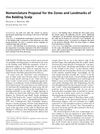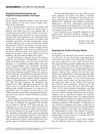 January 2010 in “Springer eBooks”
January 2010 in “Springer eBooks” Hair transplant works best in healthy individuals, and those with medical issues need extra care.
 37 citations,
April 2013 in “Plastic and Reconstructive Surgery”
37 citations,
April 2013 in “Plastic and Reconstructive Surgery” Genetic and environmental factors, like smoking and exercise, affect male hair loss.
 9 citations,
November 2008 in “Facial Plastic Surgery”
9 citations,
November 2008 in “Facial Plastic Surgery” Effective scalp reconstruction requires a wide range of surgical skills and an understanding of hair biology.
 8 citations,
April 2001 in “Dermatologic Surgery”
8 citations,
April 2001 in “Dermatologic Surgery” Michael L. Beehner proposed a standardized way to describe balding areas on the scalp to help hair restoration experts communicate better.
 2 citations,
March 2013 in “Hair transplant forum international”
2 citations,
March 2013 in “Hair transplant forum international” Research on "hair cloning" for hair loss shows potential for hair thickening but has not yet achieved new hair growth in humans.
 January 2024 in “Annals of Dermatology”
January 2024 in “Annals of Dermatology” Hair transplants are highly satisfactory for treating female-pattern hair loss.
 January 2014 in “Plastic Surgery”
January 2014 in “Plastic Surgery” Follicular Unit Extraction (FUE) for hair transplants has limitations and may not be suitable for most patients.
 January 2008 in “Elsevier eBooks”
January 2008 in “Elsevier eBooks” More men are getting cosmetic surgery, with nose jobs and hair transplants being popular, and choosing a qualified surgeon is important.
 June 2004 in “Dermatologic Surgery”
June 2004 in “Dermatologic Surgery” The commentary suggests that using a single-scar technique for hair transplants can give good cosmetic results, but some surgeons hesitate to use it despite ways to address their concerns.
 December 1999 in “Dermatologic Surgery”
December 1999 in “Dermatologic Surgery” Experts discussed sedation, hair transplant techniques, and called for respectful professional communication.
 198 citations,
October 2011 in “Journal der Deutschen Dermatologischen Gesellschaft”
198 citations,
October 2011 in “Journal der Deutschen Dermatologischen Gesellschaft” Use minoxidil for hair loss; finasteride and dutasteride for men, dutasteride for women.
 112 citations,
October 2005 in “Mayo Clinic Proceedings”
112 citations,
October 2005 in “Mayo Clinic Proceedings” Minoxidil and finasteride can slow hair loss and stimulate regrowth, but won't restore all lost hair or reverse complete baldness.
 17 citations,
March 2011 in “Pediatric Dermatology”
17 citations,
March 2011 in “Pediatric Dermatology” Two Sikh brothers developed permanent hair loss from wearing turbans tightly, a condition that became apparent after they moved to Austria.
6 citations,
November 2018 in “American journal of transplantation” UV light helped human hair transplants survive in mice without broad immunosuppression.
 6 citations,
February 1974 in “The BMJ”
6 citations,
February 1974 in “The BMJ” The document concludes that scalp disorders can be treated with hair washing, specific shampoos, medications, and sometimes surgery or hair transplants, but hereditary baldness is untreatable.
 1 citations,
July 2018 in “Elsevier eBooks”
1 citations,
July 2018 in “Elsevier eBooks” FAPD and possibly CCCA may be AGA subtypes, and treatments combining antiandrogens, hair growth agents, hair transplants, and anti-inflammatories could be effective.
 May 2023 in “Journal of Clinical Medicine”
May 2023 in “Journal of Clinical Medicine” New understanding and treatments for hair loss are improving, but more research is needed.
 November 2019 in “International journal of research in Ayurveda and pharmacy”
November 2019 in “International journal of research in Ayurveda and pharmacy” A man regrew hair in 15 days using Pracchana and cupping therapy.
November 2022 in “Regenerative Therapy” Advancements in tissue engineering show promise for hair follicle regeneration to treat hair loss.
 22 citations,
April 2011 in “Anais Brasileiros de Dermatologia”
22 citations,
April 2011 in “Anais Brasileiros de Dermatologia” Hair transplants can lead to hair loss from lichen planopilaris, and patients should be tested and wait two years before the procedure.
 January 2016 in “Georg Thieme Verlag eBooks”
January 2016 in “Georg Thieme Verlag eBooks” The document recommends personalized, culturally sensitive treatments to rejuvenate the aging Asian face, focusing on natural results and specific techniques for skin, hair, and facial features.
 September 2024 in “Journal of Cosmetic Dermatology”
September 2024 in “Journal of Cosmetic Dermatology” Robotic hair transplants are easier and quicker to learn than traditional methods.
 16 citations,
July 2023 in “Acta biomaterialia”
16 citations,
July 2023 in “Acta biomaterialia” The study developed a new way to create hair-growing tissue that can help regenerate hair follicles and control hair growth direction.
3 citations,
January 1999 in “Hair transplant forum international” Hair transplant surgery can effectively treat hair loss in women.
3 citations,
November 2021 in “Frontiers in Medicine” Advanced male pattern baldness affects the back of the scalp, reducing hair follicles.
 36 citations,
January 2012 in “International Journal of Trichology”
36 citations,
January 2012 in “International Journal of Trichology” Losing eyelashes or eyebrows can be a sign of many different health problems and needs a careful approach to treat effectively.
 September 2012 in “Hair transplant forum international”
September 2012 in “Hair transplant forum international” The document concludes with the creation of a Hair Transplant Foundation after reviewing the early hair transplant techniques and discussions from a forum.
 July 2011 in “Facial Plastic Surgery”
July 2011 in “Facial Plastic Surgery” The document provides a quiz for physicians to earn continuing medical education credits in facial plastic surgery.
 September 2001 in “Dermatologic Surgery”
September 2001 in “Dermatologic Surgery” Scalp surgery guidelines ensure best cosmetic results and fewer complications.
 15 citations,
February 2016 in “Dermatologic Surgery”
15 citations,
February 2016 in “Dermatologic Surgery” Dermatologists are the main innovators in noninvasive cosmetic procedures, with other specialties also contributing significantly.


























